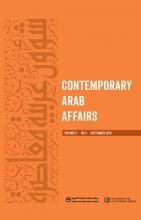 In the face of recent political changes resulting from the Arab Spring and its continuing impact on the Arab political landscape, the future of Arab countries and peoples still remains subject to economic and social factors. This special virtual issue of Contemporary Arab Affairs is intended to further our understanding and analyses of these factors which are still affecting the region.
In the face of recent political changes resulting from the Arab Spring and its continuing impact on the Arab political landscape, the future of Arab countries and peoples still remains subject to economic and social factors. This special virtual issue of Contemporary Arab Affairs is intended to further our understanding and analyses of these factors which are still affecting the region.
Read the Virtual Issue
Economic analyses provide not only a clearer understanding of historical patterns of development, they also account for the wider scale of global imbalances and geopolitical dynamics across the region. In the first article in this virtual issue, Omar A. M. El Joumayle deals with such issues and identifies the power links to oil and other strategic spaces or resources. He demonstrates how the influence of geopolitical actors on Iraqi oil policies created more instability in that country, thus bringing to light the reasons why the Iraqi people are dispossessed of the right to have control over their own lives, as is indeed the case in many other oil-rich countries.
Inequality, poverty and unemployment remain high in the Arab world. Such phenomena have conventionally been interpreted as the result of weakened governmental institutions. The resolution has been limited to adopting guidelines from international organizations and financial institutions that “push” decision makers to follow policies aimed towards stability in Arab economies. In reality, however, these measures have only resulted in further instability and inequalities, reflecting a lack of attention to the analysis of other aspects of the crises that have struck the region and ignited the protests of the Arab Spring and beyond. One such aspect is the neglect of class structure in Arab societies, which is highly significant in understanding why institutions do not work in conjunction with the interests of the people who remain the real motors for social change, as indicated by Ahmad Mousa Badawi.
Thus, the recommendations made by international institutions, in particular the World Bank and the International Monetary Fund (IMF), in reality have not contributed to the improvement of Arab livelihoods. In fact, they have worked against the interests of Arab populations, as Moosa Elayah elucidates. As underscored by Abdullah Al-Beraidi, multiple defects of the reigning neoliberal ideology call for more scrutiny of the formulas that have been advanced by international institutions and adopted by most of the region’s governments. The Arab Spring revolts further undermine the credibility of countless reports and bulletins published by the IMF and the World Bank that boast of the achievements made by Arab countries that successfully implemented neoliberal policies—in particular Tunisia and Egypt.
In addition, the implementation of structural adjustment programs in Arab economies have narrowed expenditures on the public sector, which have not only degraded the capacities of Arab societies to further their social productivity, but also their level of participation in public affairs. This is because the logic of the market overstepped the values of democracy and this may, partially at least, explain the regional phenomenon of the “brain drain.” This tactic of discouraging Arab youth is further explored in Sa’ad el Deen’s article, in which she discusses the patterns behind “voluntary immigration” in Palestine, mainly originating from economic policies imposed by occupation.
Understanding why Arab economies have been predominately stagnant and continue to maintain the same characteristics prior to the Arab Spring also requires an examination of the regions’ historical development and its relations with the outside world concerning structures that go beyond those of dictatorship or authoritarianism. Hence, it is vital that we turn our attention to the changes in Arab political economies amidst the attempt to dispose of dictatorial power structures, as described by Georges Corm. Riadh Béchir’s article offers a concise example of how fifty years of economic marginalization of certain regions in Tunisia crippled the capacities to formulate valid plans for post-revolutionary regional development.
The editors of Contemporary Arab Affairs hope that this collection of previously published articles collected here in this special virtual issue on economics will help to further our understanding of the crucial issues and highlights the challenges that still lie ahead.
We invite you to read this virtual issue for free for a limited time.
UNLOCK ACCESS TO ALL CAA CONTENT:When you subscribe to Contemporary Arab Affairs, you get access to all current and archival content dating back to 2008. Click here to subscribe or recommend the journal to your library.

